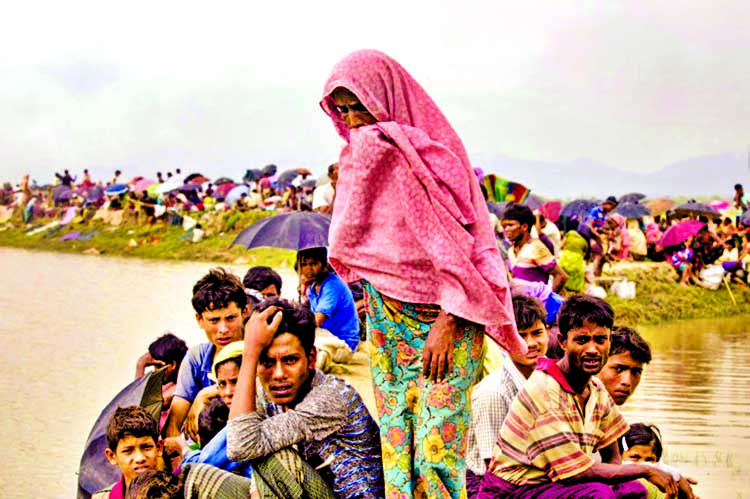
Staff Reporter :
The humanitarian situation in Rakhine State is worsening rapidly, putting tens of thousands of Rohingyas’ lives at risk as the Myanmar authorities imposed restrictions on international aid there.
Besides, Rohingya people are already suffering horrific abuses from a disproportionate military campaign, Amnesty International said on Tuesday.
Nearly 1,25,000 Rohingya refugees have entered Bangladesh since a fresh upsurge of violence in Myanmar on August 25, the United Nations said on Tuesday, as fears grow of a humanitarian crisis in the overstretched camps.
The UN said 123,600 had crossed the border in the past 11 days from Myanmar’s violence-wrecked Rakhine State.
Their arrival has raised fears of a fresh humanitarian disaster in already crowded camps in Bangladesh — home to around 400,000 Rohingya refugees before the latest crisis — struggle to cope with the influx
Aid workers told Amnesty International of an increasingly desperate humanitarian situation in Rakhine State, where the military has been engaged in a large-scale operation since attacks on dozens of security posts on August 25, reportedly by the armed group Arakan Rohingya Salvation Army.
“Rakhine State is on the precipice of a humanitarian disaster. Nothing can justify denying life-saving aid to desperate people. By blocking access for humanitarian organizations, Myanmar’s authorities have put tens of thousands of people at risk and shown a callous disregard for human life,” said Tirana Hassan, Amnesty International’s Director for Crisis Response.
“These restrictions will affect all communities in Rakhine State. The government must immediately change course and allow humanitarian organizations full and unfettered access to all parts of the state to assist people in need.”
Aid activities have been suspended in the northern part of the state for the last week, while in other parts, authorities are denying humanitarian actors access to communities in need, predominantly people from the Rohingya minority.
According to humanitarian workers, restrictions on their activities and access began in early August but deteriorated significantly since the August 25 attacks.
Tens of thousands of people have been forced to flee from their homes since the violence began.
Thousands of people – mostly Rohingya – are believed to be stranded in the mountains of northern Rakhine State, where the UN and International NGOs are unable to assess their needs or to provide shelter, food and protection.
One humanitarian official working on Rakhine State told Amnesty International:
“The Muslims are starving in their homes. Markets are closed and people can’t leave their villages, except to flee. There is widespread intimidation by the authorities, who are clearly using food and water as a weapon.”
Rohingya refugees who have fled into Bangladesh have spoken of witnessing horrific abuses by the Myanmar security forces, including killings of people trying to flee and burning of whole villages.
In late 2016, the Myanmar army launched a vicious campaign in response to an attack by Rohingya militants. At that time, Amnesty International documented violations by the army including rapes, killings, torture and burning of villages, which may have amounted to crimes against humanity.
“The Myanmar military has responded to the militant attacks in a completely disproportionate way. Its campaign of violence is again targeting ordinary Rohingya people on the basis of their ethnicity and religion and it must end immediately,” said Tirana Hassan.
The government has further exacerbated the situation by accusing international humanitarian workers of supporting the Rohingya armed group, after INGO-branded food items were found in an alleged militant camp in northern Rakhine State.
The U.N. refugee agency says some 123,000 Rohingya refugees have fled to Bangladesh since violence erupted in Myanmar on August 25.
UNHCR spokeswoman Vivian Tan said Tuesday that the latest number is a result of aid workers conducting new, more accurate counts in both established and makeshift refugee camps.
Tan said “the numbers are very worrying. They are going up very quickly.” The older, established refugee camps for Rohingya have already reached capacity, and thousands were struggling to find shelter.
Meanwhile, Members of Rapid Action Battalion (RAB) detained 50 Rohingya nationals in Cox’s Bazar on Monday for entering the country amid escalating tension in Myanmar’s Rakhine state following an attack by insurgents.
RAB set up a check post led by Major Md Ruhul Amin, company commander of RAB-7, in link road area under sadar upazila of the distrct, said a press release.
They detained 50 Rohingyas conducting drives in different vehicles.
Later, the detained Rohingyas were handed over to the members of Border Guard Bangladesh (BGB) of Ghumdhum camp.

